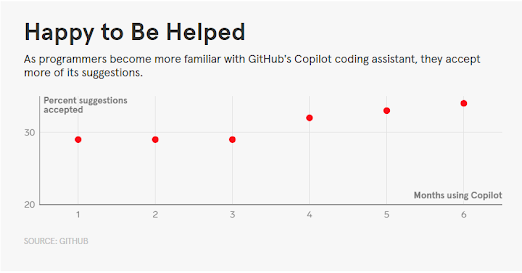The immense capability and latent risks of AI-generated code.
While algorithms can expedite programming, there's evidence that AI coding assistants can also amplify the occurrence of bugs.
Copilot, a sort of auto-complete for computer code driven by OpenAI's text-generation engine, was introduced by GitHub in JUNE 2021. It gave us a sneak preview of the amazing potential of generative AI to automate worthwhile tasks. Two years later, Copilot is among the most developed illustrations of how technology may take over manual activities.
This week, Github published a research that illustrates how transformative generative AI coding has become. The analysis is based on data from roughly a million programmers who paid to utilise Copilot. They accepted the AI assistant's recommendations on average 30% of the time, which indicates that the system is exceptionally adept at foretelling beneficial code.

The eye-catching graph above demonstrates how customers prefer to take more of Copilot's recommendations as they use the service for longer periods of time. Based on a prior Copilot study that revealed a connection between the quantity of ideas accepted and a programmer's productivity, the paper also comes to the conclusion that AI-enhanced coders experience an improvement in productivity over time. The most significant increases in productivity, according to GitHub's latest research, were observed among less seasoned employees.
That appears to be an outstanding image of a revolutionary technology immediately demonstrating its worth. Any technological advancement that increases productivity and strengthens the skills of less trained people could be beneficial to both individuals and the whole economy.
In its subsequent back-of-the-envelope calculations, GitHub predicts that AI coding will increase the global GDP by $1.5 trillion by 2030.
But when I was discussing programmers' relationships with tools like Copilot with Talia Ringer, a lecturer at the University of Illinois in Urbana-Champaign, I was reminded of another study I had recently read about.
You can read also: What Is the Difference Between Deep Learning and Learning Machines?
A Stanford University team published a study late last year that examined the impact of employing a code-generating AI assistant they developed on programmers' ability to write high-quality code. The researchers discovered that programmers who received AI recommendations tended to add more problems to their finished code, even if those who had access to the tool thought their code was more secure. Coding alongside AI "probably has both advantages and disadvantages," claims Ringer. "More code does not equal better code,"
Also See:
Machine learning, Neural networks, Deep learning, Natural language processing, AI algorithms
Robotics, Computer vision, Data science, AI ethics, Automation, Cognitive computing, AI applications, AI in healthcare, AI in finance, AI in education, AI in business, Chatbots, Virtual assistants, Reinforcement learning, AI research










0 Comments
If you have any doubt, Please let me know.